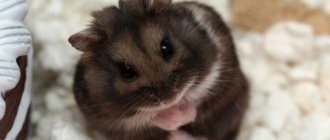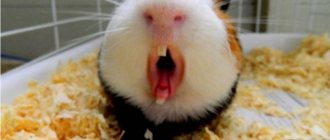The ability to bite is inherent in nature in almost all animals, especially predatory ones. Moreover, when an animal bites, sometimes this does not mean that it is aggressive. On the contrary, in this way it often expresses its good mood and disposition to play. Another thing is that for humans such bites are sometimes not very pleasant. In order for a domestic ferret to learn to control his impulses, training is necessary.
Why does the animal bite?
In the wild, when a small ferret grows up among his brothers and sisters near his mother, he already knows from early childhood when and how to bite. When playing with their fellow ferrets, they lightly bite each other in amusement and playfulness. But, for example, for the purpose of protection it will be a different bite - painful and frightening. When an animal finds itself at home, the function of a mentor is automatically transferred to the owner’s shoulders; he must teach the baby how and in what situations to behave.
The ability to bite in ferrets is observed early, from about 4 weeks after birth. This is the best time to nip this habit in the bud.
Important! The older the animal, the more difficult it is to deal with its bites. For the same reason, it is difficult to work with ferrets purchased from special farms. In such conditions, they are left to their own devices from birth and grow up aggressive.
Habits
Ferret puppies begin to bite when they are about a month old. In this way, they not only protect themselves, but also learn about the world and interact with the opposite sex in the future. Then, during the mating process, the male holds the female by the withers with his teeth, and this does not cause her any problems due to the thickness of the skin. But for humans, a ferret bite can be very painful. As a child, the animal does not feel the strength to clench its jaws. And if you don’t try to wean him from this habit, over time the games will become more aggressive.
It is worth starting to breed a ferret from an early age, as it will be much more difficult to tame an adult pet. The habits of an adult animal have been developed for a long time, and when the owner changes, it can show aggression. Here you have to earn the trust of your pet and prove that the new home is safe for him.
It is necessary to raise a pet ferret from an early age.
Ferrets are very active and playful. In the process, they can simulate an attack on a person, as if they represent him as an enemy. In most cases, this behavior is not aggressive at all. The animal is simply trying to engage you in play or show its affection.
But in fact, these animals bite very hard. Thanks to their long, sharp fangs, they can easily puncture an artery, tear a piece of meat, and even crush a small bone.
Bites in the game
Having played out, the animal may at some point lose control of itself and clench its jaws more tightly than the owner would like. In general, ferrets tend to actively show their playful mood. Moreover, they demonstrate exactly the same habits in the wild. At such moments they jump (sometimes on 4 legs at once) and attack from the side. This kind of war dance should be perceived as a manifestation of positive excitement. In order to stop it, you can try to switch the ferret's attention to something more interesting.
Another way: when the ferret bites, you need to say the word “No” loudly and clearly. Over time, the animal gets used to the owner expressing his dissatisfaction in this way. When working with any animal, it is important that it develops an understanding of certain commands. This can be achieved only by repeating the same commands over and over again. If you express your dissatisfaction in different words, it is unlikely that the animal will begin to understand anything.
If an animal has crossed the boundaries in a game, it is recommended to limit its activity. A cage is suitable for these purposes. This technique works even when there are several ferrets in one place. Over time, the animal understands what leads to confinement in a cage and tries to avoid these moments.
The most important thing is consistency
Remember to repeat these steps all the time if your ferret bites. Only if these conditions are met will you achieve success. And your pet will remember that if he bites, the game will definitely stop.
How to stop a domestic ferret from biting, what other measures can be taken? The method using “yummy” food for the animal is considered very effective. Simply put, whenever an animal does not bite during play, reward the pet with something tasty (for example, meat). Just don't overdo it. The piece should be small, otherwise it will not have the best effect on the digestion of the “scamp”.
Causes
There are actually many reasons why a ferret bites. All of them can be adjusted over time.
The animal is afraid of a new environment
Moving to a new habitat is always stressful for an animal, and ferrets are no exception. The reaction to a new apartment and people can be the most unpredictable: fear, a desire to hide, aggression, a desire to bite.
Anger in this case has no meaning, it is simply a desire to demonstrate the ability not to be offended. This is the case when no action needs to be taken; the time required to get used to the new place must pass.
Important! Having recognized the friendly attitude of others, kindness and care, the ferret will gradually calm down and begin to behave more friendly.
Ferret is afraid of humans
Overcoming fear of people is the most difficult thing, especially if it is an adult animal that has never seen anything good from a person. Sometimes it can take a long time for a ferret to develop trust.
Fear of people is manifested by hissing, squealing, and fluffy fur. Punishment in such situations is prohibited; this will only make things worse. Negative emotions can only be smoothed out with patience, affection and kindness.
During this period, it is better to place the ferret in a room where as few people as possible will be present, to ensure a calm environment. Of course, it is advisable to keep a wild animal in a cage and equip it so that the ferret can hide in it.
You can let the ferret walk around the room for a while, observing the behavior from the outside. Starting from about the third day in the house, you can try to gently pet the animal. If it is not aggressive, you can even play with it. First, toys are used for this, this will avoid bites. Only when the animal gets used to it and begins to trust the person, you can start picking it up.
Ferret checks
Often, once in a human home, an animal conducts a kind of check. The ferret needs to understand who the person is and how to behave with him. Having no further means to check this, the ferret resorts to biting.
In this case, weaning an animal from a bad habit is quite simple. Clear words that are repeated over and over again will help, for example, “No.” It is also necessary to make it clear to the ferret that his bites cause pain. As soon as the animal bites, you need to sharply withdraw your hand and loudly say “Ouch.”
Other reasons
A ferret may bite for the following reasons:
- The ferret exhibits a predatory instinct. This should be kept in mind at all times. This manifests itself when an adult animal that has managed to live in the wild is brought into the house.
- The animal is in pain. At such moments, aggression can manifest itself, it is expressed in the desire to bite.
- The animal has entered the rutting period, at this moment the males stand out - they become more aggressive and can bite.
What to do when bitten by a ferret
Minor wounds and scratches from ferret teeth do not require special treatment.
But ferret bites can be quite painful ; the predator has 4 sharp fangs, each about 10 - 15 mm long. With them he can not only pierce, but also tear the tissue of the victim.
Very often, a person brings his hand to the cage and does not expect an attack from the ferret, who is sniffing it peacefully. The animal not only sinks its fangs, but also pulls the hand towards itself, and the man, out of surprise, pulls it towards himself. This results in quite deep wounds, and blood flows from the bites.
Do not try to put your hand into the cage. The animal regards it as a threat to its territory and, protecting it from invasion, will try to bite.
If the ferret does bite, then:
- the bite site is treated with hydrogen peroxide;
- lubricate the space around the wound with iodine or brilliant green;
- if necessary, stop the bleeding with a hemostatic sponge.
This treatment is carried out for 5-6 days. If the person bitten is allergic, he will have to take an allergy pill. For very deep lacerations, you may need to go to an emergency room to be stitched up by a surgeon.
If the animal has not been vaccinated, then this information should be reported to the doctor. He will decide whether to vaccinate the patient against tetanus, rabies and other diseases.
In general, a bite from a domestic ferret is no more dangerous than a bite from a domestic cat.
Training
It is advisable to start using some training methods as soon as the animal gets into the house. The sooner you start training, the faster the animal gets used to the owner’s commands.
All commands must be given in an even voice. Even if it is a cry, it should not be shrill. Squealing, on the contrary, excites the animal and provokes aggression. In the future, when the animal gets used to the owner, it becomes even easier to show its dissatisfaction - just stop playing. The ferret perceives this acutely and understands that he did something wrong.
Constant repetition of the same thing is the basis of any training. Only an exactly repeating algorithm is stored in the animal’s head. The ferret learns to respond correctly and the desired success is achieved. The intonation of the voice means a lot to the animal. If the owner speaks in a loud, harsh voice, the animal understands that something is wrong and tries to behave better. Conversely, when a person speaks quietly and calmly, the ferret feels at peace.
Nobody canceled rewards for good behavior. If during the game the ferret has never crossed the boundaries of what is permitted, he can be rewarded with meat. All it takes is a small piece; there is no need to turn the reward into a full meal.
The animal is afraid of people
If the biting is caused by the animal's fear, then getting out of this situation will be the most difficult. This usually happens in adults who were mistreated before coming into your home. Enough time must pass for the animal to trust you.
Signs that characterize fear: hissing, sharp squeals, fluffy tail. Never physically punish such ferrets as this will only make the situation worse. Only with patience and affection can you win the animal’s trust.
First you need to reduce the number of irritants, or better yet, remove them altogether. On the first day of your ferret's stay, take him to a quiet room where there are no children. The animal remains in the cage for now. To make him feel calmer, you can cover it with thick, “breathable” fabric, or simply place a ferret house inside it, where he can hide.
The next day, you can release the animal, but limit its space to one room, while you remain in the role of an observer.
And only on the third day, slowly begin to communicate with the ferret, try to gently stroke it, play with it. But first, play with toys that will help avoid animal bites. And only when the ferret gets used to such games, it will be possible to pick him up and play.
Attack from around the corner
Sometimes a ferret can attack the owner or other household members and bite the legs on the sly. This is something different than biting your hands while playing. This is a bad habit. It is urgent to get rid of it, but it is not too easy.
It is recommended to use one method. You need to stock up on two sprays; they can be purchased at pet stores. One should have a bitter taste that is unpleasant for the ferret, the second should be sweet, which can be used as a treat for the animal.
Feet should be sprayed with bitter spray. When the ferret tries to bite, it will be unpleasant for him. Immediately after the incident, apply a sweet spray to some area of the body (for example, the palm) and offer the ferret to lick it. It is important that the animal feels the contrast, then it will gradually come to understand: biting is unpleasant, bitter, but if you lick it, you can feel a pleasant taste. Gradually, the ferret will wean itself from biting its legs.
How to toilet train?
Puppies quickly become toilet trained. Raising adults is more difficult. It is necessary to know some physiological characteristics of animals. They defecate within 15 minutes. after waking up.
This point must be taken into account and take the puppy to the litter tray. In 3-4 days he will understand why the container was installed in the cage
Ferrets are released into the room for walking after they have settled into the tray. Otherwise, he will find a toilet in some corner of the room. If this happens while walking, the area is washed and irrigated with a product with a pungent odor.
Unfortunately, these measures do not always help. If the animal defecated once in the room, then it is easier to put another tray in this place. It will be difficult to retrain the animal:
- They advise you to take a piece of droppings and take it to the tray;
- the pet will look for a place to toilet and smell the smell from the container;
- in it he will perform the act of defecation.
It is recommended to take from breeders individuals who are trained to go to a certain place. When raising a ferret, you need to be patient.
Mistakes in training
Common mistakes when training a ferret include:
- Clicks on the nose. People often try in this way to let the animal know that biting is not allowed. This is strictly forbidden, since any animal’s nose is a very sensitive place, a working tool. If you slightly miscalculate the force of the blow, you can easily provoke a nosebleed and a variety of injuries. The consequence of such treatment will only be an increase in the level of aggression on the part of the ferret. Using force, you can raise an angry, ill-mannered and distrustful animal.
- Using thick gloves is a common mistake. Using gloves will never teach a ferret to control the force of its bite: no matter how you bite, it still doesn’t hurt the owner. The animal simply no longer needs to analyze its behavior. And if it tries to bite, for example, on the leg, the person will feel pain, but the animal will not understand this. He wasn't taught that biting is bad.
Ways to solve the problem
The methods used to correct the situation with ferret bites should be directed in a “peaceful direction.” You cannot be cruel, as rodents are very sensitive to anger, and begin to act in the opposite order - they become even more aggressive.
Walks, communication, treats
Spend more time with your pet: go for a walk in the yard or even in the park. When walking in an unfamiliar environment, ferrets often cling to their owner, seeking protection. This is how warm relationships are born.
But keep in mind that before this, long-term home communication is required. Otherwise, during a walk, the ferret may bite.
Communication is as follows:
- talk to him in a gentle tone;
- stroke the fur and cheeks;
- if necessary, pronounce commands in a strict tone (no, no, ugh), since ferrets are easy to train;
- accustom to hands from birth - first hold for a few minutes, gradually increasing the time;
- During tactile interaction, give the animal a treat, causing lasting positive associations.
Reward your pet with treats more often - let him know that only the owner is the source of treats.
Alternative Methods
One of the best ways to prevent biting is to read your ferret's body language to gauge its mood, as you need to know when to back off and leave it alone.
Beware of his actions:
- runs with an arched back, bristling fur, and splayed front paws;
- jumps from side to side, backing and hissing;
- licks another ferret or person just before biting.
You need to know which situations bring out the worst in your pet. Be a good observer. Try to find out what irritates him.
What radical and alternative methods are used to wean a ferret from biting:
- don’t wait, punish immediately after the bite (if this is not done, he will remember that he once got away with it and will try to bite again);
- use intonation - say strictly “fu” immediately after its action;
- use the ignoring method - the animal understands when they are offended;
- stop playing if the bite occurs during entertainment;
- take the initiative - start a game that develops the correct behavior of the ferret, then praise him and offer a reward (food);
- play with him every day;
- when biting, hiss as animals do or spray water on the face (using a spray bottle);
- do not stick your fingers through the wires of the cages - the pet will think that your finger is a toy or a treat;
- Avoid giving goodies from the palm of your hand;
- Do not allow children to hold or touch the ferret without an adult present;
- never hand over your pet to someone who is afraid - the ferret feels fear and is able to react with a bite;
- when weaning off appropriate behavior, lubricate your hands with bitter products;
- if you are sure that the pet behaves badly due to its character, use force: take the obstinate person by the scruff of the neck, shake (not too much) or press it to the surface (floor, tabletop, etc.), temporarily depriving him of his freedom;
- You are allowed to flick the animal on the nose, but lightly.
Don’t forget: your four-legged friend should have a clear idea of the inevitability of punishment for a bite. Punish only immediately after the incident.
Extreme measures
As a rule, ferrets learn the above training methods. But sometimes a ferret, like any other animal, can be persistent and unwilling to obey. In such cases, there is only one option left: imitating the behavior of the mother in the wild.
When the ferret once again makes an attempt to bite, it must be carefully lifted by the scruff of the neck and shaken slightly. This is how females teach their cubs to be orderly. For the same purposes, you can lightly press the ferret to some surface and drag it along it. These movements should have a sobering and calming effect on the rowdy. Apart from this, no other, harsher influence can be used. This will only cause even greater aggression; the animal may harbor a grudge.
Defensive reaction
You have a hamster, which you brought into the house, trying to start getting acquainted and communicating as quickly as possible, but why did he bite your outstretched hand?
In such a situation, most rodents do not understand such zeal, as they experience stress from moving, new surroundings, smells and people around them. It is not surprising that Djungarian hamsters bite in an attempt to protect themselves from the unknown. The new resident needs time to adapt, and your attention should be consistent and restrained, this will gradually help you wean the baby from biting.
In addition to stress, remember that the dzhungarik is by nature a wild animal that prefers loneliness
And the new owner’s attempts to show attention and affection, scratch behind the ear or stroke them, are perceived by him as something out of the ordinary.
Khomas are quite aggressive even towards their relatives, energetically defending their territory; it is quite possible that this instinct could transfer to you.
Another reason why hamsters start biting is asociality, usually associated with an initial lack of attention. Most often this occurs in pet stores, where no one communicates with jungarians, and as a result, they are quite hostile towards humans.
The sooner a small rodent is taught to communicate and given pleasant gifts in the form of various goodies served by hand, the less likely there is for such a problem to arise.
If you have adopted a dwarf that is older than two months, be prepared for the fact that it may be necessary to wean it from biting.











